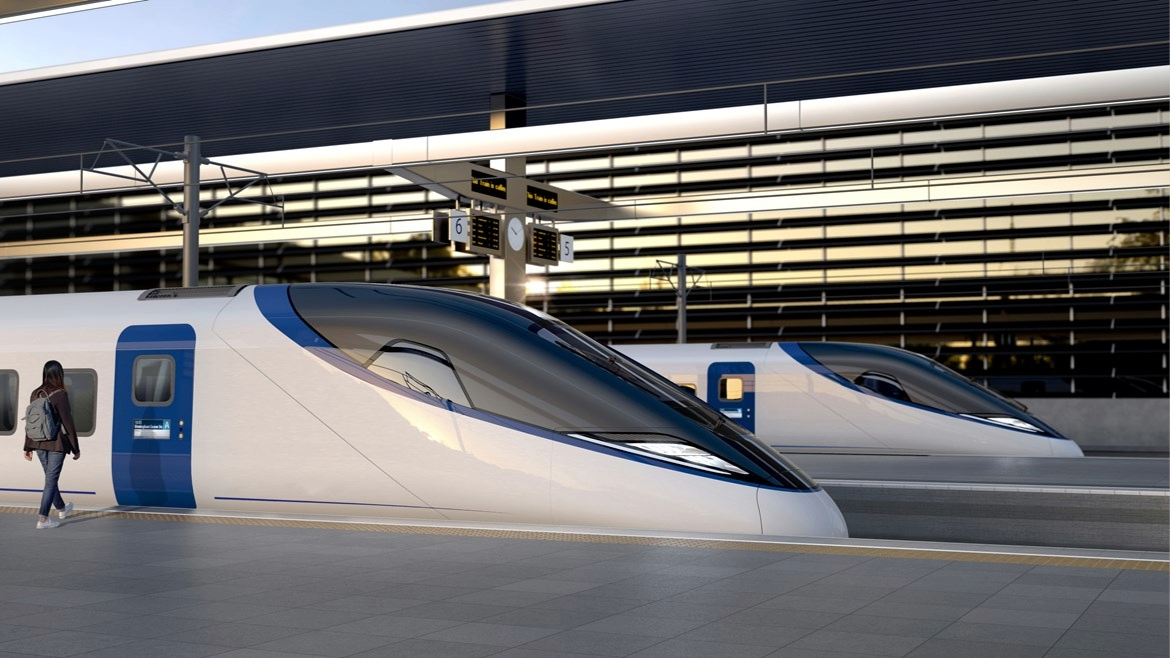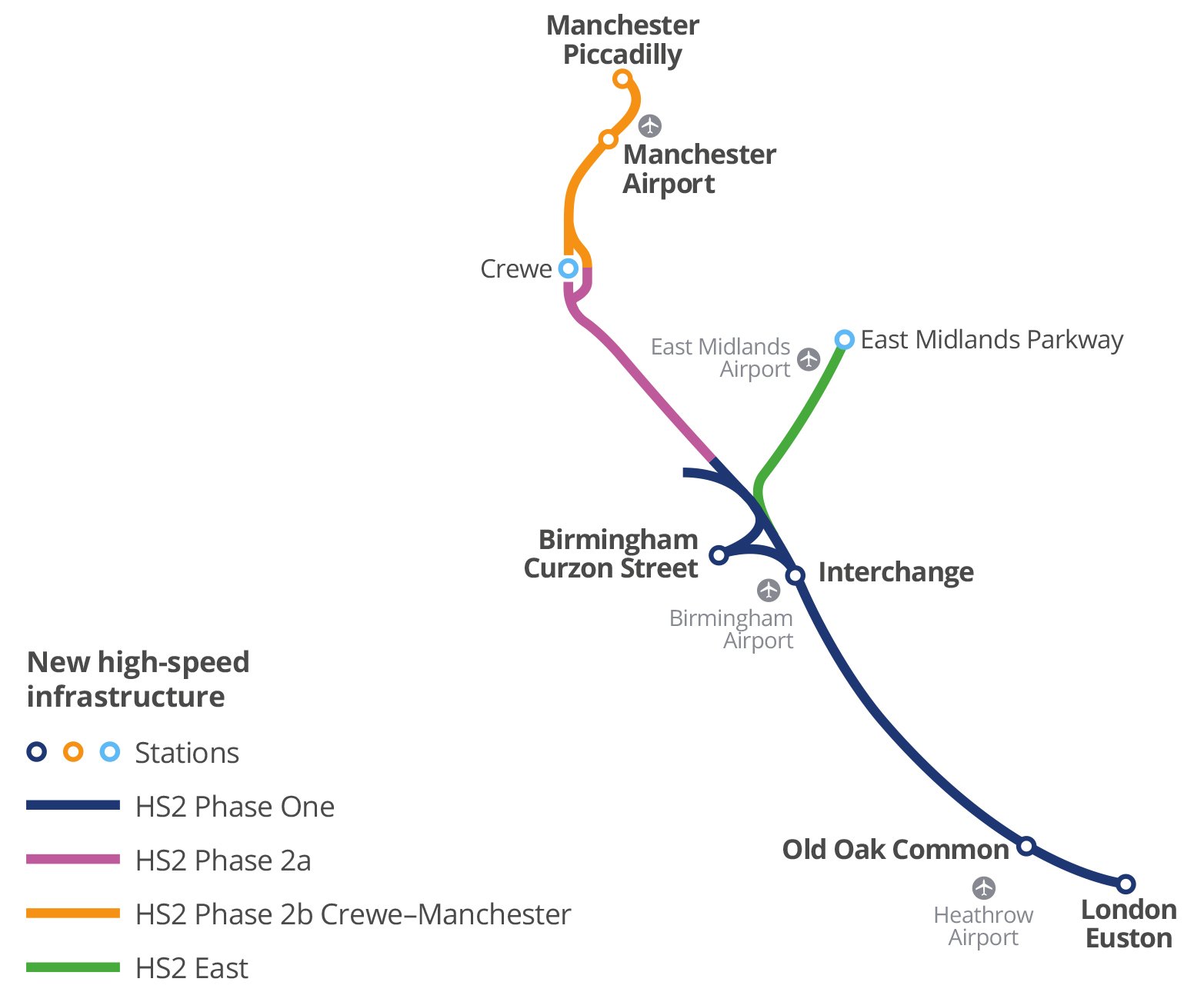
Prime minister Rishi Sunak yesterday confirmed at the Tory party conference the axeing of the northern leg of the HS2 after weeks of speculation over the high-speed rail line’s future.
Although the prime minister scrapped Phase 2 connecting Birmingham and Manchester, he said the leg connecting London Euston to Birmingham would be finished “given how far along construction is”. However, he added that the Euston project would continue under new management.
“The management of HS2 will no longer be responsible for the Euston site,” said Sunak. “There must be some accountability for the mistakes made, for the mismanagement of this project.”
HS2 had recently awarded £300m in ground investigation contracts towards Phase 2.
The PM pledged to “reinvest every penny” of the £36bn he said will be saved by cancelling Phase 2 in “hundreds” of transport infrastructure projects in the north, the Midlands and the rest of the country.
How has the industry reacted?
The construction industry has reacted with disappointment to the prime minister’s announcement and is asking the government to commit to its new infrastructure plans and to finishing the first leg of HS2.
Eddie Tuttle, director of policy, external affairs and research at the CIOB
“Long-term infrastructure projects, like HS2, employ large numbers of skilled workers and apprentices and go some way to securing a pipeline of consistent work for the construction sector.
“It is well recognised that the built environment industry works best when it has certainty in policy making and investment, so we hope the HS2 funding is reinvested into similar projects which will support the upskilling of the construction workforce, particularly in the north of England, where such investment is so vital for the levelling up agenda.

“In a time of economic uncertainty, it is now more necessary than ever for government to commit to public sector projects.”
“In a time of economic uncertainty, where we are witnessing supply-chain collapse, it is now more necessary than ever for government to commit to public sector projects that benefit not only the local workforce and their communities but also the wider economy.
“It’s therefore important government moves quickly to provide more detail on the plans it now has to improve the transport infrastructure in the north and communicates with the construction sector which will be responsible for delivering them.”
Paul Hamer, chief executive at Sir Robert McAlpine
“If we hope to build affordable infrastructure that offers value to the UK and stimulates economic and social growth, we need to take a longer-term view on infrastructure investment. With HS2 prized as the UK’s flagship levelling-up project, it’s disappointing that the economic and political climate has deterred this ambitious project to improve and rebalance the overall economic health of the country from inception to completion.
“Infrastructure is one of the key pillars of economic longevity and improvement. Whilst it is promising for industry and the country to see the alternative infrastructure investments proposed, proposals must now be accompanied by robust delivery plans to ensure intentions are viable and we are still building towards a better future, rather than taking a step back.”
Stu McInroy, chief executive of the Construction Plant-hire Association
“The news that the Manchester leg of HS2 is to be cancelled is extremely disappointing and a significant blow to the UK construction sector. This decision shall undoubtedly further undermine confidence and impact future investment at a time when the economy remains fragile.

“Whilst in no way likely to offset the negative effect of cancelling the Manchester leg of HS2, it is imperative that Mr Sunak’s commitment to completing the HS2 line to Euston, and diverting Manchester leg funding to a plethora of other projects aimed at boosting transport infrastructure in the north, are actioned without delay. Construction is a key driver of economic growth and CPA members will now be watching very closely what the government does next.
“Failure to follow through with current infrastructure plans has already damaged confidence in UK construction and impacted on the UK as a destination for international investment. We can ill-afford the government to repeat this failure again.”
Tim Seal, head of construction at law firm Ridgemont
“[Yesterday’s] decision removes a big piece of work for the construction industry and will be a source of disappointment and uncertainty for many businesses that were gearing up for Phase 2 of HS2. This is particularly the case for companies that have already landed contracts for Phase 2.
“They will need to scrutinise their agreements to see where they stand from a legal perspective. In particular, what does the termination clause say about terminating the contract where the government shelves the project? It may well have been drafted to limit or exclude the contractor from having a right of recourse, which would make it difficult for affected businesses to dispute the termination of their HS2 contracts.”
Dr David Crosthwaite, chief economist at the Building Cost Information Service
“The cancellation of the HS2 link to Manchester is a sad indictment of the government’s ability to plan and deliver major investment, which can only damage our reputation with investors at home and abroad.
“It would be interesting to know how much time and money has been wasted on reviews and audits. The way to deliver a major infrastructure project or indeed any project is to plan first and build fast.
“It is difficult to take positives from this decision and while many of the proposed alternative uses of the money are welcome, what guarantee do we have that they will ever be delivered?”
Comments
Comments are closed.












Interesting that at a time of such turmoil and change within the sector the Construction Leadership Council (CLC) maintains a complete silence, heads down below the parapet, conspicuous by their paucity of comment..!
We need to ask, “Are they fit for purpose or just another quango?”
HS2 was a vanity project from the start. £106bn to reduce travel time by an hour and not programmed to be completed until 2041! Both of those figures likely to go up even further in that time.
A 2 hour travel time is quite reasonable in my opinion, it can take 2 hours to get from South to North London!
It has been a shambles from start to its belated demise. Spend the money on improving everything about the existing system.
It takes a brave project manager to advise sponsor that the project cannot be delivered at budget in a timely manner to specification. Perhaps they will rename it High Speed 2050.
So how has the construction industry become the fall guy for government dithering and delay? Anything to do with the industry’s record of failures to deliver? Optimism bias, stop-go, changes in spec, objectives, leadership …
As said above. Millenium Dome a good reminder- it CAN be done. It has been done. McAlpines and Laing- where are they now?